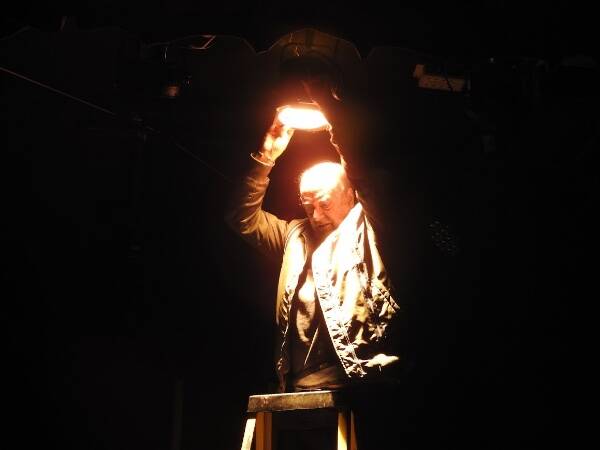By Toby Cooper
Sounder contributor
“Time and tide,” the proverb goes, “wait for no man.” So wrote Geoffrey Chaucer in 1395 – 629 short years ago – to rail against the sins of procrastination. With a wistful nod to the ticking clock and the movement of tides beneath his ship, Doug Bechtel agreed with the old bard Chaucer and announced his retirement from Actors Theater Orcas Island.
Bechtel’s imprint on the local performing arts is pervasive. He has produced and directed countless theatrical events – as many as 100, he thinks – mostly under the umbrella of ATOI which he founded a quarter century ago. He has recruited hundreds of island residents, with or without prior stage experience, to act, sing, love, live, and die in front of their delighted friends and neighbors.
Reaching beyond the stagecraft, Bechtel crafted bylaws and named officers so that ATOI would survive the test of time.
Still, Bechtel came to his career in theater through an unlikely back door. Reflecting on his eclectic history, Bechtel speaks of graduating from the US Coast Guard Academy in New London, Connecticut, and commanding Coast Guard vessels in Pacific coastal waters. His last command was in Cordova, Alaska.
Upon leaving the Coast Guard, he bought a Cordova radio station and later joined the town’s electric utility.
“I moved to Orcas from Alaska in 1988,” he said. His first job was running OPALCO. But he soon became involved with a high school production of Our Town. “Every high school has to do Our Town at some point,” he said. With that, Bechtel’s life was changed forever.
By the mid-1990s, Orcas Center was sponsoring a “Reader’s Theater” series which captured Doug’s creative imagination. “We would move all around the island,” he recalled of the minimalist productions that needed almost no scenery or props. “The last one we did was Neil Simon’s 1977 Broadway hit Chapter Two. We took it to West Sound, Deer Harbor, and the Outlook.”
By their Rosario performance, the cast rebelled, refusing to “move every night,” he recalls. A few years later, ATOI was born, for which he has served as director, president, treasurer, and other roles ever since.
At about the same time, Bechtel helped found the Orcas Island Community Foundation, Orcas Island’s grant-making entity in support of community arts, non-profits, and education.
In 2006, Bechtel’s life changed again when Marie, his wife of 34 years became incapacitated, and he shouldered the unfamiliar role of caregiver. He did so willingly, discovering that “ATOI helped to keep me centered.” Marie passed in 2020.
“Doug Bechtel is a gift to the community,” says Tom McDonough, a key member of ATOI’s governance and tech support. “We all love and appreciate him as the finest kind of human being. We should name a mountain after him.”
“Everyone who has been involved with an ATOI production owes Doug a debt of gratitude,” says Tom Fiscus, who has both acted and directed. “I know I do.”
With its roots embedded in nomadic readers’ theater productions, ATOI never owned its own real estate. Accordingly, Bechtel adopted the island’s humble Grange building as a home-away-from-home.
Built around 1880 as Orcas Island’s first schoolhouse, the building was acquired by The Orcas Grange in 1938 for all of $126.00. Renovations in 1945 doubled the footprint, creating the playhouse configuration which by 1995 attracted Bechtel’s attention. With an early grant from the then-new OICF, the transformation to a community center was implemented.
Five years later, Bechtel, Bill Westlake, and other Grange members spent another two years renovating the building and adding seating. “We installed theater lighting,” Bechtel says now.
Today, Bechtel thinks of retirement in stages. “I have given up control [of ATOI],” he says. “I don’t miss that.” But he reads 50 plays per year – many sent unsolicited by admiring playwrights – with 14 on his current wish list. “I am visualizing it on our stage as I read,” he adds. “Is it a good story? Can I find those characters on Orcas?”
And “finding characters on Orcas” is what sets this man apart. “I go out of my way to avoid prejudging how well new people might fit a particular role,” he says.
Suzanne Gropper, Melinda Milligan, Linda Sanders, Liz Doane, Larry Hempel, Tom Fiscus and so many others have taken bows for years as Bechtel stands in the back, already taking mental notes on the next production.



